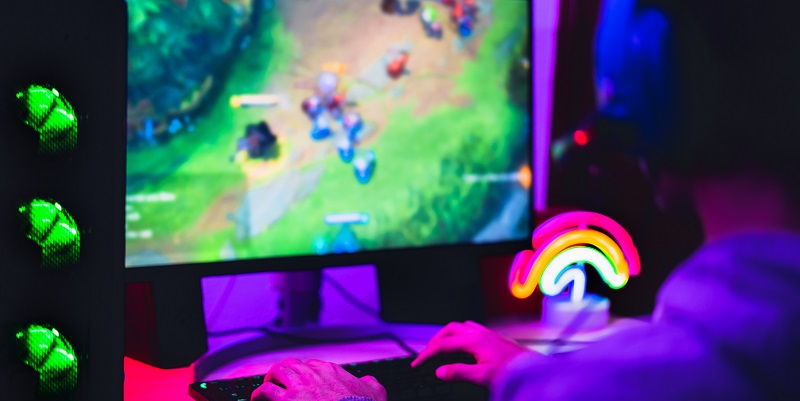In recent years, blockchain gaming has emerged as a groundbreaking concept that combines the cutting-edge technology of blockchain with the immersive world of video games. By leveraging the unique features of blockchain, this nascent industry is revolutionizing the gaming landscape, offering true ownership of assets, secure gameplay through smart contracts, and exciting financial opportunities through DeFi integration.
Advantages of blockchain gaming
One of the key advantages of blockchain gaming lies in the concept of true ownership of assets. In traditional gaming models, players often face restrictions when it comes to owning in-game items, characters, or virtual real estate. However, in blockchain gaming, this barrier is shattered as non-fungible tokens (NFTs) are utilized to grant players complete ownership of digital assets. NFTs, powered by blockchain technology, provide immutable proof of ownership, giving players the freedom to buy, sell, and trade their virtual possessions with ease.
Moreover, blockchain gaming ensures secure gameplay through the implementation of smart contracts. These self-executing contracts have predefined conditions written into their code, thereby making the gaming experience transparent and trustless. With smart contracts governing various aspects of gameplay, asset ownership, and reward distribution, players can enjoy a level playing field and a fair gaming environment.
Furthermore, the integration of blockchain and decentralized finance (DeFi) opens up new financial avenues in the gaming industry. Players can participate in decentralized exchanges, lending platforms, and yield farming, turning their in-game achievements and assets into real-world value. This seamless integration eliminates the need for intermediaries, allowing gamers to monetize their skills and investments more efficiently.
Risks and challenges
As with any emerging industry, blockchain gaming is not without its risks and challenges. It has already seen its fair share of failed projects, highlighting the need for thorough due diligence before investing. Prospective investors should carefully evaluate the development team, project roadmap, and community engagement to gauge the potential success of a blockchain gaming project. By conducting thorough research, investors can make informed decisions and mitigate risks associated with the industry.
NFT Renting as a Promising Investment Opportunity
An interesting prospect within the blockchain gaming space is the concept of NFT renting. NFT renting allows asset owners to lease out their digital assets to other players, thereby creating an additional revenue stream. This emerging trend holds significant potential as it offers a unique opportunity for individuals to invest in coveted digital assets and generate passive income while helping others experience the joy of using these rare items.
Transformation of gaming industry norms
Blockchain gaming is transforming the traditional gaming industry norms. With the introduction of blockchain technology, the gaming landscape is evolving, leading to a better gaming experience for all. By granting players true ownership over their assets, blockchain gaming disrupts the conventional model where players are at the mercy of centralized authorities. Instead, decentralized networks put power into the hands of the players, fostering a sense of empowerment, autonomy, and fairness.
Ownership of digital assets
In traditional gaming models, players often face limitations in owning in-game items, characters, or virtual real estate. Blockchain gaming, however, leverages NFTs to grant true ownership of digital assets. With NFTs, players have the freedom to acquire, trade, and sell their virtual possessions, giving them a sense of tangible ownership. This innovation has the potential to reshape the gaming industry, blurring the lines between virtual and real-world assets.
Decentralization and trustless gameplay
Centralized authority control is a common feature in traditional gaming models, leading to a lack of transparency and trust among players. Blockchain gaming eliminates the need for central authority through decentralized networks, ensuring trustless gameplay. By leveraging the power of blockchain technology, players can engage in peer-to-peer interactions, participate in decentralized governance, and find greater security in their gaming experiences.
Smart contracts and gaming protocols
Smart contracts play a pivotal role in blockchain gaming by providing predefined conditions written into their code, ensuring fair and transparent gameplay. These self-executing contracts govern various aspects of gaming, such as asset ownership transfers, in-game transactions, and reward distributions. By automating these processes, smart contracts enhance efficiency, security, and fairness in the gaming ecosystem.
Lack of quality games in the blockchain gaming space
As an emerging industry, the blockchain gaming space is still in its early stages of development. Consequently, there is a scarcity of high-quality games available to players. While there are numerous promising projects, the industry needs more talented developers and innovative ideas to create captivating and immersive gaming experiences. As the market grows, it is expected that the number of high-quality games will increase, catering to the diverse interests and preferences of gamers.
Blockchain gaming has the potential to revolutionize the gaming industry by merging cutting-edge blockchain technology with the immersive world of video games. With advantages such as true ownership of assets through NFTs, secure gameplay with smart contracts, and financial opportunities through DeFi integration, this emerging industry is poised for significant growth. However, potential investors should approach it with caution, conducting thorough due diligence to mitigate risks. As the industry evolves, further advancements, like NFT renting, are expected to emerge, offering lucrative investment opportunities. With blockchain technology reshaping industry norms and providing a better gaming experience, the future of blockchain gaming holds immense promise.

